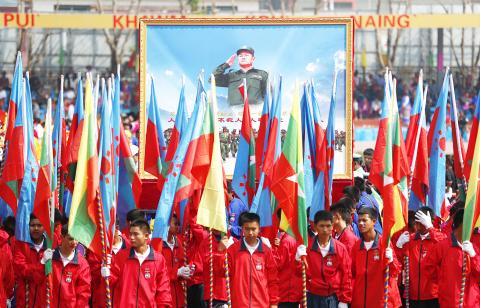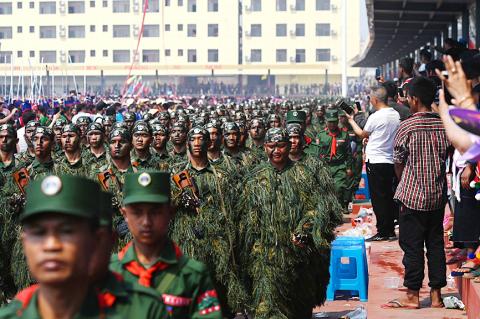It has a standing army of 25,000, manufactures its own guns and conscripts at least one member of each household — meet the United Wa State Army (UWSA): communist, reclusive, China-backed rebels determined to protect their supremacy over Myanmar’s badland border zone.
Thousands of soldiers, including a company of women and a sniper platoon in combat webbing, early yesterday marched alongside armored vehicles in Panghsang, capital of the ethnic Wa, which borders China’s Yunnan Province.
It was a show of force marking 30 years since Wa rebels negotiated a ceasefire with Myanmar leading to the establishment of special, semi-autonomous zone, led by Wa State President Bao Youxiang (鮑有祥), head of one of the world’s largest non-state armies.

Photo: EPA-EFE
This week the normally inscrutable Wa extended a rare invite to foreign media to their territory to show off their military prowess and deliver a defiant message of self-sufficiency within Myanmar’s borders.
“The Wa people are masters of their own destiny,” Bao, flanked by senior Chinese officials, declared in an address to the thousands gathered for the parade.
He vowed his 600,000 “war-tested” people would never be pawns in proxy wars and proclaimed the “builders and defenders of Wa” as “one of the best groups in human society.”

Photo: AFP
Fed by a ready supply of conscripts — some barely in their teens — China-armed and trained, the UWSA bears comparison to Lebanese Hezbollah in size.
Like the Hezbollah they are clients of a larger state actor, who pulls strings for strategic ends, but the UWSA also taps a deep seam of local pride and enmity toward the central state, which is dominated by the Bamar ethnic group.
Estimates vary, but experts put the UWSA strength at 25,000 to 30,000 regulars, backed up by a large, well-trained reserve.
Wa forces dwarf the collage of other ethnic rebel groups operating in Myanmar, posing a deterrent to the country’s “Tatmadaw” army and gifting Beijing a useful bridgehead into its resource-rich neighbor.
“We haven’t suffered fighting in decades and have developed over these 30 years,” said a UWSA officer, requesting anonymity. “But we need to be ready. Our leader’s motto is: ‘Sweating a lot leads to a little blood.’ So one or two people from each household must serve in the Wa Army.”
Once a Chinese enclave, the Wa became known by British colonizers as the “wild Wa” for their fearsome reputation for headhunting.
Since becoming a special region, the zone has undergone an economic boom of sorts. It is home to one of the world’s largest tin mines and massive rubber plantations.
Regional drug cops say it plays a central role in the “Golden Triangle” narcotics trade, forged over decades of opium production.
The Wa have long been accused of running a narco-state peppered with meth labs — claims Wa leaders vehemently deny.
“Poppy cultivation will never appear again,” said Bao, citing its eradication as one of his state’s “proudest achievements” and vowing to combat all drug production.
However, independent analysis is impossible. Wa remains virtually locked-off, resistant to outside visitors, ringed by checkpoints and tight internal controls.
The publicity-shy septuagenarian Bao has helmed the region for decades. An unassailable, authoritarian figure, he presides over a political hierarchy that shadows the structures of China and a tightly controlled society.
“In the mould of [Chinese President] Xi Jinping (習近平), Bao is the head of the army, party and government, and has been confirmed in those positions for life,” said Anthony Davis, a Bangkok-based security analyst.

POLITICAL PRISONERS VS DEPORTEES: Venezuela’s prosecutor’s office slammed the call by El Salvador’s leader, accusing him of crimes against humanity Salvadoran President Nayib Bukele on Sunday proposed carrying out a prisoner swap with Venezuela, suggesting he would exchange Venezuelan deportees from the US his government has kept imprisoned for what he called “political prisoners” in Venezuela. In a post on X, directed at Venezuelan President Nicolas Maduro, Bukele listed off a number of family members of high-level opposition figures in Venezuela, journalists and activists detained during the South American government’s electoral crackdown last year. “The only reason they are imprisoned is for having opposed you and your electoral fraud,” he wrote to Maduro. “However, I want to propose a humanitarian agreement that

ECONOMIC WORRIES: The ruling PAP faces voters amid concerns that the city-state faces the possibility of a recession and job losses amid Washington’s tariffs Singapore yesterday finalized contestants for its general election on Saturday next week, with the ruling People’s Action Party (PAP) fielding 32 new candidates in the biggest refresh of the party that has ruled the city-state since independence in 1965. The move follows a pledge by Singaporean Prime Minister Lawrence Wong (黃循財), who took office last year and assumed the PAP leadership, to “bring in new blood, new ideas and new energy” to steer the country of 6 million people. His latest shake-up beats that of predecessors Lee Hsien Loong (李顯龍) and Goh Chok Tong (吳作棟), who replaced 24 and 11 politicians respectively

Young women standing idly around a park in Tokyo’s west suggest that a giant statue of Godzilla is not the only attraction for a record number of foreign tourists. Their faces lit by the cold glow of their phones, the women lining Okubo Park are evidence that sex tourism has developed as a dark flipside to the bustling Kabukicho nightlife district. Increasing numbers of foreign men are flocking to the area after seeing videos on social media. One of the women said that the area near Kabukicho, where Godzilla rumbles and belches smoke atop a cinema, has become a “real

‘WATER WARFARE’: A Pakistani official called India’s suspension of a 65-year-old treaty on the sharing of waters from the Indus River ‘a cowardly, illegal move’ Pakistan yesterday canceled visas for Indian nationals, closed its airspace for all Indian-owned or operated airlines, and suspended all trade with India, including to and from any third country. The retaliatory measures follow India’s decision to suspend visas for Pakistani nationals in the aftermath of a deadly attack by shooters in Kashmir that killed 26 people, mostly tourists. The rare attack on civilians shocked and outraged India and prompted calls for action against their country’s archenemy, Pakistan. New Delhi did not publicly produce evidence connecting the attack to its neighbor, but said it had “cross-border” links to Pakistan. Pakistan denied any connection to